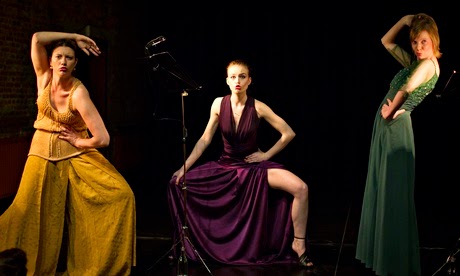 Like McMillan and Truemann, Lyn Gardner begins her review by explaining what a siren is. And, like the other critiques, Gardner discusses the power of the episodes and their message (confused and jumbled, perhaps deliberately, and acting as a mosaic rather than a polemic). However, her conclusion, which would later be used on the show's posters, is problematic.
Like McMillan and Truemann, Lyn Gardner begins her review by explaining what a siren is. And, like the other critiques, Gardner discusses the power of the episodes and their message (confused and jumbled, perhaps deliberately, and acting as a mosaic rather than a polemic). However, her conclusion, which would later be used on the show's posters, is problematic.Big, bold, brazen, and not a hussy in sight. Only real women asking what it means to be a feminist.
Again, I might demur at the word 'feminist' here, preferring 'a woman in a patriarchal society': but this, like my comments on McMillan and Truemann's use of the word, is a point of emphasis. Indeed, as I write this, the less convinced I become that my nuance is important.
My problem is with the dualism between 'hussy' and 'real women.' It seems to imply that the hussy is not a real woman - I am not quite sure what a hussy is, these days, despite the excellent book by Jane Graham reclaiming another old fashioned word, Floozie. I imagine this refers to the number of women who have made theatre that revolves around sexually charged content (Naked in Alaska, Sister).
I am certainly not calling those artists hussies, or anything less than real women. But using the word 'real' in this context bothers me. It's theatre, first of all, and reality is up for grabs. But does 'real' imply a CIS woman? In the context of this sentence, it seems to suggest that a real woman is, simply, not a hussy.
To finally get to my own critique of Sirens, I would argue that it is a strong, evocative and passionate description of diverse experiences of women. It ranges from responses to pornography - the humorous 'masturbation contest' - to a horrific moment that appears to represent a sexual assault. It wanders between condemnations of the hold of beauty products and female competitiveness, and, unforgettably, shifts between sexual terror and fantasy for an unsettling trip around human sexuality. The multiple voices on stage - only worked in concert when they howl like a Fluxus composition - offer different perspectives and the lack of direct argument deceives. It appears as a single rhetorical presentation, when diverse voices are speaking.
Truemann does attempt to challenge the theatricality, sensing a deception, a mismatch between message and construction. Yet we are all agreed that it is a remarkable piece of performance, that challenges the audience.
To deny a feminist intent is petty - like me - but if it is feminist, what is the message? It's clear that women have a tough time, and are oppressed. Beyond that, it says nothing, only laying out examples in a creative, provocative manner.
It is up to the audience decide what this all means.
My problem is with the dualism between 'hussy' and 'real women.' It seems to imply that the hussy is not a real woman - I am not quite sure what a hussy is, these days, despite the excellent book by Jane Graham reclaiming another old fashioned word, Floozie. I imagine this refers to the number of women who have made theatre that revolves around sexually charged content (Naked in Alaska, Sister).
I am certainly not calling those artists hussies, or anything less than real women. But using the word 'real' in this context bothers me. It's theatre, first of all, and reality is up for grabs. But does 'real' imply a CIS woman? In the context of this sentence, it seems to suggest that a real woman is, simply, not a hussy.
To finally get to my own critique of Sirens, I would argue that it is a strong, evocative and passionate description of diverse experiences of women. It ranges from responses to pornography - the humorous 'masturbation contest' - to a horrific moment that appears to represent a sexual assault. It wanders between condemnations of the hold of beauty products and female competitiveness, and, unforgettably, shifts between sexual terror and fantasy for an unsettling trip around human sexuality. The multiple voices on stage - only worked in concert when they howl like a Fluxus composition - offer different perspectives and the lack of direct argument deceives. It appears as a single rhetorical presentation, when diverse voices are speaking.
Truemann does attempt to challenge the theatricality, sensing a deception, a mismatch between message and construction. Yet we are all agreed that it is a remarkable piece of performance, that challenges the audience.
To deny a feminist intent is petty - like me - but if it is feminist, what is the message? It's clear that women have a tough time, and are oppressed. Beyond that, it says nothing, only laying out examples in a creative, provocative manner.
It is up to the audience decide what this all means.
No comments :
Post a Comment